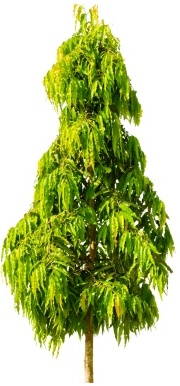Kashtadaru – Polyalthia longifolia Uses, Research, Side effects
Kashta Daru – Polyalthia longifolia is often referred to as False Ashoka, because it is very commonly used as a substitute for Ashoka – Saraca indica. This is because, both these trees have similar qualities and appearance.
It is planted on the sides of highways, as it is very effective in reducing noise pollution!
Botanical name- Polyalthia longifolia Benth Hook.f.ver. Pandurata
Family- ANNONACEAE (Sitaphala kula)
Table of Contents
Vernacular names
Names in different languages:
English name- Mast tree, False Ashoka, Buddha Tree, Cemetery tree
Hindi name- Devadari, Nakali Ashoka
Kannada name- Gauri, Habbe, Ubbina mara
Tamil name- Nadunar, Nettilinkam நெட்டிலிங்கம்
Telugu name- Naramamidi
Malayalam name – araNamaram: അരണമരം
Gujarati name – Asopalav
Urdu name – Asupal
Bengali name – Debdaru
Indonesian name – Glodogan tiang
Sanskrit Synonyms – Devadari
Major chemical constituents
Stem bark- Leucocyanidin , Proanthocyanidin(I) , a- Sitosterols; Campesterol etc
(Reference: Illustrated Dravyaguna VIjnana, Vol. II, by Dr JLN Shastry)
Crude extracts of the leaves of Polyalthia Longifolia indicated the presence of alkaloids, tannins, saponins and glycosides.
Identification of anti oxidant principles – Activity guided fractionation of the ethanolic extract of the leaves of the P. longifolia var. pendula led to the identification of quercetin 1, quercetin-3-O-ß-glucopyranoside 2, kaempferol-3-O-α-rhamnopyranosyl-(1→6)- ß-galactopyranoside 3, kaempferol-3-O-α-rhamnopyranosyl-(1→6)-ß-glucopyranoside 4, rutin 5 and allantoin 6 as the active constituents from butanol fraction.

Habitat
It is native to Sri Lanka. But it is planted on the road sides, throughout India.
Medicinal qualities
Polyalthia longifolia medicinal qualities:
Guna (qualities) – Laghu (lightness), Rooksha (dryness)
Rasa (taste) – Tikta (bitter), Katu (pungent)
Vipaka- Katu – Undergoes pungent taste conversion after digestion.
Veerya- Ushna – Hot potency
Effect on Tridosha – Kapha Pittahara – Balances Kapha and Pitta Dosha.
Part used, dosage
Part Used: Stem bark, Leaves
Dose – Decoction – Kashayam – 50 – 100 ml, in divided dose per day, or as directed by doctor
Sanskrit verse

Uses
Kastadaru – Mast tree – Polyalthia longifolia uses:
Laghu – light to digest
Rooksha – dry
Tikta – Bitter
Katu – Has pungent taste as well.
Ahima – Hot potency
Deepana – Improves digestion.
Useful in the treatment of :
Krumi – worm infestation (in wounds and in intestines)
Meha – urinary tract disorders, diabetes
Jwara – fever
Kushta – skin diseases
It is useful in reducing Blood pressure
Because of its mild laxative effect, it is useful in constipation.
Research
Phyto-chemical screening, antibacterial activity – Uzama D, Ahmadu R, Bwai DM, Thomas SA. Phytochemical Screening And Antibacterial Activity Of Polyalthia Longifolia Crude Extracts. www.scopemed.org/?mno=13194 [Access: March 09, 2015].
Anti-microbial potential of seed oil
Side effects
There are no known side effects with this herb.
Seek medical guidance for use during pregnancy and lactation.
Interaction with medicines, supplements
Can this be used while taking Homeopathic medicine?
Yes. This product does not react with homeopathic medicine.
Can this medicine be continued while taking supplements like multivitamin tablets, Omega 3 fatty acids etc?
Yes. Generally, this product goes well with most dietary supplements. However, if you are taking more than one product per day, please consult your doctor for an opinion.
With western
medicines
Seek your
doctor’s advice if you are taking this product along with other western
(allopathic / modern) medicines. Some Ayurvedic herbs can interact with modern
medicine.
If both Ayurvedic and allopathic medicines are advised together, then it is
best to take Allopathic medicine first, wait for 30 minutes and then take the
Ayurvedic medicine.
Sthanika Karma (Systemic Action)
Internal administration-
Digestive system – Facilitate normal movement of vata dosha. Ant helminthic in action. Indicated in Amadosha, Constipation, Helminthiasis etc.
Circulatory system – Helps to reduce elevated blood pressure.
Excretory system – Indicated in Diabetes mellitus
Tvak – Indicated in skin diseases.
Tapakrama – Indicated in fever







